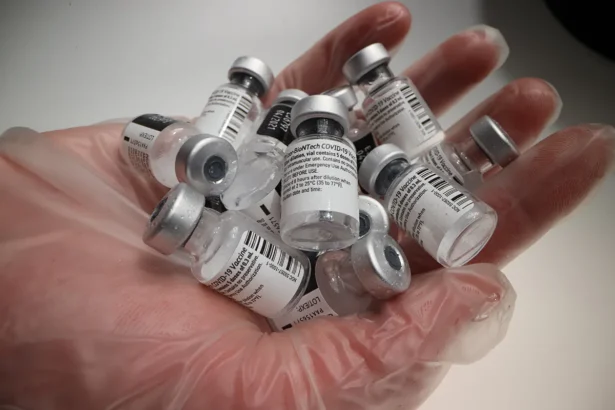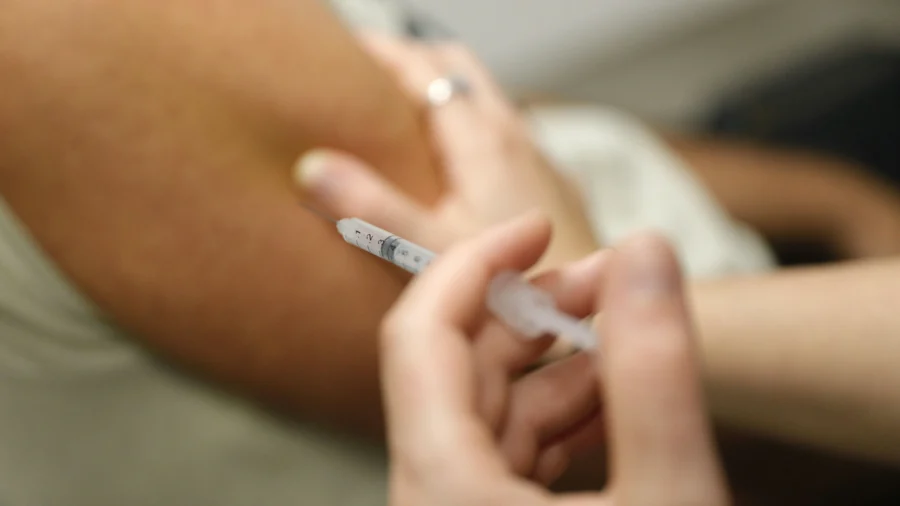Dutch molecular biologist Dr. Maarten Fornerod warned that the world should be “very cautious with genetic medicines” while pointing to a recent study showing that mRNA vaccines produced foreign proteins that posed unknown risks.
In a Dec. 20 program on the German news platform Blckbx, Dr. Fornerod was asked about a Dec. 6 study published in Nature, which showed that the mRNA vaccines produced foreign proteins other than the spike protein aimed at immunization. “The consequences are that you get those unexpected proteins, those shuffled proteins, which actually have no known meaning for the cell,” Dr. Fornerod said.
“But just as with a word, if you shuffle the letters of a word, you sometimes also get a word that means something. And then the question is how does the cell react to that? What kind of instruction does it give to the cell? So that I think is, yes, that’s a possible danger.”
“If just a brain cell starts functioning less well, then, of course, after a while, you notice that the body functions less well,” Dr. Fornerod explained. “It has been shown that these foreign proteins can indeed elicit an immune response.”
A key problem is that the harmful effects of foreign proteins are “unpredictable,” the molecular biologist stated, adding that it was unknown how an organism, its immune system, and cells react to these proteins.
Even though only one in a thousand individuals may face such a problem, it becomes a major social issue once billions of people are injected with these mRNA vaccines, he warned.
Dr. Fornerod said, “We must be very cautious with genetic medicines. That means not only mRNA vaccines but also CRISPR-Cas. Also with genetic manipulation to cure diseases. You have to be very careful because there can be unexpected things that you can expect.”
He warned that similar consequences will be seen in other mRNA vaccines currently being developed by companies like Moderna and Pfizer.
“They have a whole array of mRNA vaccines slated against influenza, against RSV. But they will all suffer from this problem” of generating foreign proteins.
Study Implications
The Dec. 6 Nature study focused on the issue of foreign protein production triggered by mRNA injections. COVID-19 mRNA vaccines work by enabling the body to manufacture spike proteins that mimic the COVID-19 virus.
The body then reacts to spike proteins—generating protective immunity. If the COVID-19 virus were to enter the body in the future, this protective immunity would then neutralize the foreign invader.
However, researchers found that “the cellular machinery that ‘reads’ mRNAs ‘slips’ when confronted with repeats of a chemical modification commonly found in mRNA therapeutics,” according to the study’s press release.

“In addition to the target protein, these slips lead to the production of ‘off-target’ proteins triggering an unintended immune response.”
In a recent interview with “American Thought Leaders,” critical care physician Dr. Paul Marik explained the process.
“Normally, messenger RNA (mRNA) has uridine. And that’s the way the body was made. But for this technology to work, they (vaccine manufacturers) had to substitute the uridine for a pseudouridine. And what the study shows is that when you put a pseudouridine in where uridine should be, the ribosome jumps or misreads messenger RNA.”
In cells, ribosomes produce proteins from amino acids. When mRNA vaccines are injected, the ribosome reads the mRNA to produce the protein.
However, due to the ribosome misreading the mRNA because of the pseudouridine, “it results in a bogus protein being made. So instead of making spike protein, it makes a nonsense protein that is possibly toxic.”
Researchers from multiple organizations, including Cambridge and Oxford, conducted the study.
Foreign Proteins Risk
Dutch nonprofit group “The Doctors Collective” pointed out in a Dec. 15 post that according to the Nature study, foreign proteins can make “up to 10 percent of the total production” of proteins.

“The unforeseen proteins that are made are unnatural,” it said. One of the tests conducted by the study showed that the foreign proteins were “induced in five of the 21 Pfizer mRNA vaccinees studied,” which roughly comes to one in four study participants.
It is “unpredictable” what these foreign proteins could do in a cell, it noted while suggesting these proteins may end up disrupting “an important process.” They can also “trigger harmful immune responses in some people.”
“The Doctors Collective believes that the precautionary principle should take precedence and that due to all the unexpected problems with this technology, appropriate safety studies should first be done, and no further experimentation on the population should be allowed,” the group stated.
In the Dec. 20 German program, Dr. Fornerod was asked whether vaccine manufacturers knew about the mRNA vaccines generating foreign proteins. “I assume not. But, they didn’t look very carefully either,” he replied.
The manufacturers “checked whether the code produced an approximately correct large product. But not in human cells. And they did not further check if the protein they could detect indeed had the correct composition,” Dr. Fornerod said.
“And they also saw smaller products being created. But they never checked what that actually was. The EMA (European Medicines Agency) did ask them, I believe. But there was never a clear answer on that.”
Immunologist Prof. Theo Schetters, who was also on the program, pointed out that the Nature study complicates the dangers posed by mRNA vaccines.
Apart from the production of strange proteins, mRNA vaccines have also been shown to have “DNA contaminations in them,” he said.
“We don’t want those either. That goes into your cells through those particles, too, just like that. And if it ends up in dividing cells, there’s a good chance that pieces of DNA (contaminant) are simply built into your DNA.”
From The Epoch Times


